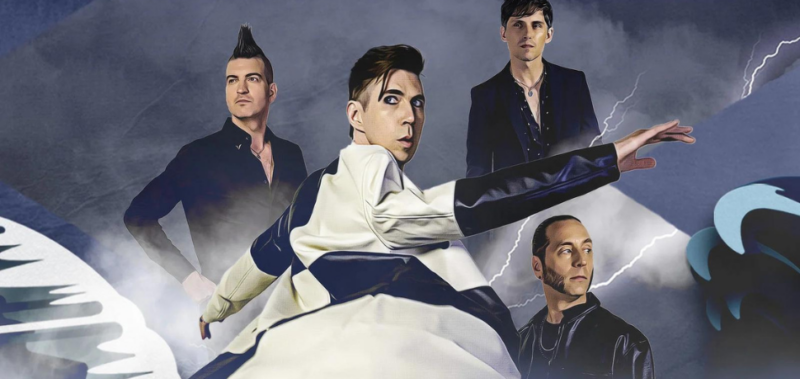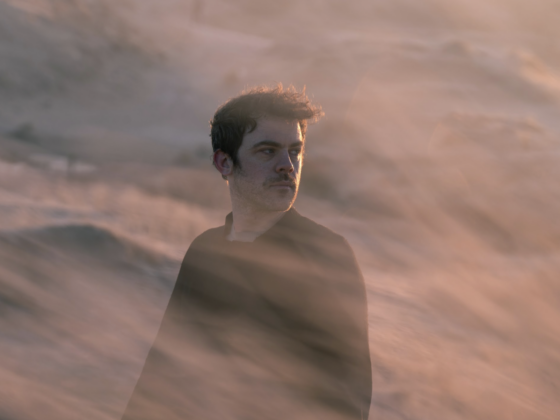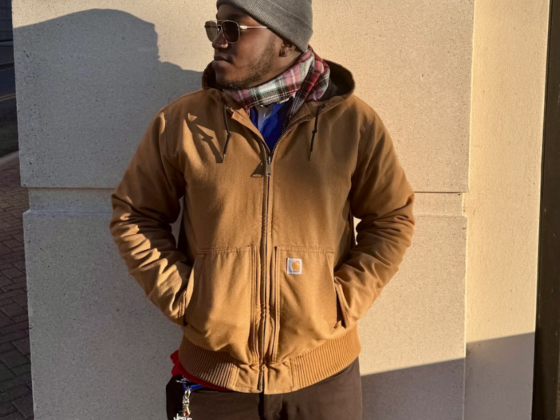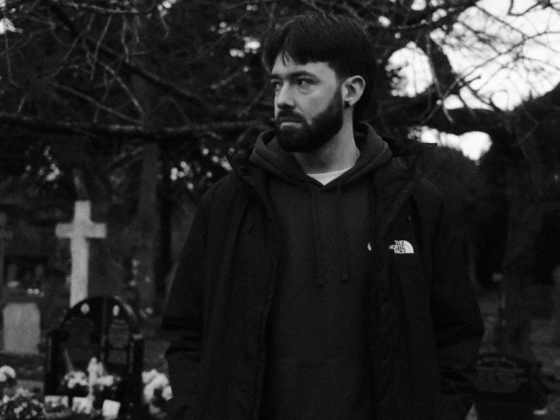Up to this point, Marianas Trench’s albums have been defined by their overarching theme of struggle.
Their 2006 debut Fix Me dealt with frontman Josh Ramsay’s mental health and the immediate aftermath of his heroin addiction. 2009’s Masterpiece Theatre grappled with the downsides of fame and expectation. 2011’s Ever After featured a loose narrative where the protagonist’s goal was to find a way home.
Their magnum opus, 2015’s Astoria, was a coming-of-age tale largely inspired by Ramsay’s broken engagement and his mother’s Lewy body dementia diagnosis. Finally, their 2019 record Phantoms was haunted by a ghostly narrative involving a lost lover named Eleonora and was recorded in a haunted house.
All of these bodies of work seem to paint Ramsay as a “tortured artist” whose best work was deeply personal and birthed from emotional turmoil.
However, when he put out a solo record, The Josh Ramsay Show, in 2022, it moved away from the general tone and cohesion of his band’s catalog and was largely celebratory, despite some of the subject matter tackled, including his recent marriage and the deaths of both his parents, carrying as much weight as before.
I’d like to push back against the argument that an artist has to be “tortured” in order to make great work; it’s broader than that. Great artists make great work from strong emotions, such as anger, happiness, sadness, confusion, and love.
Marianas Trench’s sixth album Haven, released Friday, is a prime example of this.
Instead of looking inward like in previous records, Ramsay looks outward for lyrical inspiration for the first time. He based the album’s structure on The Hero’s Journey by Joseph Campbell, and its concept from his impending fatherhood; he is currently expecting his first child with wife Amanda McEwan, whom he married in 2020.
When you first press play on “A Normal Life,” you are greeted at the door with sounds of rustling leaves and crackling thunder, painting an image of a lone house in the middle of the forest on a stormy night. Then the orchestral intro kicks in, with the strings, horns, and bass creating an atmosphere of uncertainty.
This befits the song’s concept, which explores the life a hero will eventually have to leave behind. Specifically, the narrator believes they are not suited for a normal life and something bigger awaits them.
As the song progresses towards its six-minute mark, the symphonic elements meet more modern instrumental elements in the middle. Matt Webb’s electric guitar, Mike Ayley’s bass, and Ian Casselman’s drumming share the spotlight with symphonic and synth parts that recall the ‘80s flair of Astoria and give a sense of hope for the future.
Ramsay’s vocals are as versatile as ever. He naturally reaches the same highs he has on previous records, while also using his lower register to send a chill down the listener’s spine. The backing vocals match him quite well, with the band playing with panning as if Ramsay, who also serves as producer, is conducting a choir.
The lead single “Lightning and Thunder” carries the opener’s musical tone forward, with the group harmonizing to vibrant synths and Casselman’s pattering becoming more impactful by the chorus. A climactic guitar riff from Webb drives home the idea that the protagonist’s life is about to change dramatically; the song describes the hero being called to adventure and was written after Ramsay learned he was going to be a father.
The second verse is striking because of the different insights it offers about both the fictional hero and Ramsay himself. For the hero, it implies that they have been orphaned or estranged from their parents for a while and are going into this adventure without emotional support. For Ramsay, it tells us that he will carry his parents and their lessons with him, even if they are no longer with him, and pass them along to his own child.
This is contrasted well by “I’m Not Getting Better,” whose emphasis on the tight chemistry of the band rather than the grander sound of the orchestra compliments the narrative of the hero refusing the call to adventure. Webb’s diverse guitar playing here, which spans from lingering strums to flanged pop rhythms, crafts a little musical bubble that represents the one the hero wants to stay in.
However, a gospel choir follows Ramsay’s vocals throughout, showing that destiny is also refusing to leave the hero alone. By the end, the hero realizes they cannot run away for long and the ending line, “Who said I was getting better?” signals their realization of the inevitability of accepting the call.
As such, “Down to You” brings the strings back in, feeling right at home alongside Casselman’s pummeling percussion, proving how well the hero and their new mentor work well together. The lyrics depict their first meeting and could stem from Ramsay realizing that their child will come to depend on them in the same way. What makes this song really work, though, is how it can be applied to any kind of meaningful relationship, like a friend or partner.
“Now or Never” starts with a clock ticking, signaling the actual start of the adventure, before morphing into a full-on synth-pop song. The lyrics acknowledge there is no going back because the hero has found a reason to fight; the chorus says they are fighting for love, much like how Ramsay is devoting his future to his new family. Casselman’s snare and kick-drumming build up alongside keyboards until making way for the symphony, evoking classic movie themes.
This transitions directly to “Into the Storm.” Tender piano strokes turn into pounding on the keys, as Ramsay’s production truly shines here. The strings threaten to dominate until the climax, where the band takes it back to basics with some good old-fashioned jamming.
The lyrics here depict the hero fully leaving their old life behind and realizing they will have to change from who they were before, perhaps because being that person will not help them survive. This is much like how becoming a parent will likely require Ramsay to mature and leave previous pastimes behind.
This perfectly clashes with “Ancient History,” where the hero reunites with old allies from back home who come to his aid. This arguably has the most ties to Ramsay’s life, as the lyrics mentioning Toronto and moving away from home make this a spiritual sequel to the band’s 2009 track “Acadia,” which was also about Marianas Trench’s Canadian upbringing.
Musically, this song is defined by its occasional talkbox vocals, handclaps, Ayley’s alluring bass, and emphasis on keyboards and saxophone, calling to mind Men at Work’s 1981 hit “Who Can it Be Now?”
“Stand and Fight” is mainly defined by an ethereal string arrangement, which is complemented simply by guitar and piano. This gives weight to the narrative that the hero’s character is being tested by the outside world they now face, bringing them to a crossroads.
While the “Stand and Fight” lyrics are relatively simple and driven towards one choice, the lyrics of “Turn and Run” are more complex, giving the impression that this choice the hero must make, of fight or flight, is actually difficult and important to answer. The strings here illustrate conflict, both internally and against whatever threat lies ahead. This then transitions to the orchestra and the band essentially battling for dominance in the song, before subdued vocals from Ramsay conclude this engineering marvel by saying that it’s okay to be afraid as long as you keep going.
On “Worlds Collide,” piano leads the charge alongside strings, which lean back into movie score territory, and rollicking guitar, bass, and drums. All the musical elements sound harmonious and work together for the first time rather than intentionally clashing, feeling the most collaborative thus far. All four members contribute significant vocal parts, though Ramsay’s belting remains the standout.
This song marks the climax of the album, where the hero faces their greatest challenge alongside all the allies they have gathered during their adventure. During the song, the hero acknowledges they have been preparing for this moment their entire life and knows that something will change after this. At the climax of the song itself, Ramsay, Webb, Ayley, and Casselman all sing various reprises of album tracks, with Ramsay even reprising lyrics from the three title tracks of Masterpiece Theatre.
The ending lyric states, “I’ve been waiting all my life for you to arrive,” connecting back to Ramsay’s unborn child, showing that he has fully accepted his new role as a father.
“Nights Like These” is a pop ballad, with na-na-nas, piano, and Casselman’s kick drum championing a sing-along about celebrating a hard-earned victory. In the grand scheme of the album, it mostly serves as a transitional piece, but in turn, it winds up being a great standalone song.
What makes ”Remember Me By” so memorable is its narrator being a seductive representation of the hero’s home, which is calling them to return after their adventure ends. They recognize that the hero may not want to return home, so they give them a reason to. This theme is personified by a delightful pop arrangement with no audible orchestral elements.
The conclusive title track starts out with ominous strings before finger snaps and all other musical elements introduced come in at various parts as if the hero is saying goodbye to their allies one at a time. Here, Ramsay is also imagining what it will be like to raise their child, attempting to sing them to sleep. This is represented to be difficult, considering this is the band’s longest song to date, clocking in around 8 minutes.
Past the halfway mark, various musical and lyrical motifs return once again, leading to various headbanging moments and the motif of “A Normal Life” being resolved, as the hero knows that their life will never be the same.
Standing tall amongst their best work, Haven proves that Marianas Trench still has enough magic up their sleeve to sustain them for years to come. Their adaptation of The Hero’s Journey is faithfully executed and granted a personal touch, showing the Canadian quartet is willing and able to adapt their signature blend of pop and symphonic rock to fit multiple kinds of stories.









